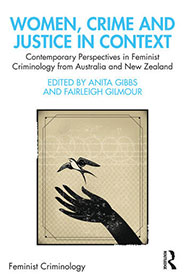Thursday 24 February 2022 3:59pm
Recently released by Routledge, Women, Crime and Justice in Context - Contemporary Perspectives in Feminist Criminology from Australia and New Zealand was edited by Social and Community Work Professor Anita

Gibbs and Dr Fairleigh Gilmour (Sociology, Gender Studies and Criminology). The book's 18 chapters (from researchers in Aotearoa and Australia) cover offending, victimization and the criminal justice system, and explore topics like sex work, prison abolitionism, community punishment, media representations of crime and victims, and the impacts of digital technology on gendered violence.
Professor Gibb hopes the book informs debate on a host of issues, and what a more just society would look like.
"[P]erhaps one that embraces diversity and is more forgiving of those who cause harm as well as being willing to take action on the drivers of crime and victimisation".

Professor Gibbs
What is the book about?
The book presents 18 chapters on contemporary feminist approaches to key issues in criminal justice. The book covers key theories, research and debates on the topics of offending, victimization and the criminal justice system. Researchers from Australia and New Zealand explore sex work, prison abolitionism, community punishment, media representations of crime and victims, and the impacts of digital technology on gendered violence. The book uses an intersectional approach, notably in chapters that focus on disability, queer criminology, indigenous perspectives, migration and service-user perspectives.

Dr Gilmour
Why did you undertake this project?
Dr Fairleigh Gilmour and I noticed a gap in the literature on good quality texts on the broad topic of women and gender and justice, and a complete dearth of New Zealand or Australian texts specific to our part of the world. Yet, we were also aware as feminist criminologists of excellent research in both countries being undertaken. Hence, we decided we could fill that gap and invited key scholars to be part of a useful book to meet the need for an up to date resource for our students and keen researchers of the antipodean.
The book concludes by exploring future directions in feminist approaches to crime and justice – what are some of the key ‘future directions’ we could take?
This conclusion highlights some of the main messages from this book including the need for harm minimisation and decarceration. The researchers contributing to this edited volume have seen and experienced many injustices and abuses of the human rights of women throughout their years as criminal justice researchers and activists. They write to improve conditions for women in justice settings, especially those most marginalised.
The focus of future directions that our authors recommend include: the abolition of prisons, the inclusion of marginalised voices in the creation of alternatives to prison, the accountability of those working in the systems of justice; the recognition that business as usual justice processes and outcomes are both oppressive and harmful and do not reduce or resolve crime. Our suggested ‘Future directions’ bring us back to questions of the prevention of crime and victimisation, as well getting our readers to understand their own position in society in relation to gender and criminal justice. The end of each book chapter poses further study questions to that end also.
You should read this book if . . .
This book will be essential reading for undergraduates and researchers studying feminist criminology, gender and crime, queer criminology, socio-legal studies, intersectionality, sociology and criminal justice. The two staff editors and a number of the book’s individual authors teach criminology papers at Otago and will draw on the book’s content for these papers.
I hope this book makes people think about . . . .
The lived experience of women involved in the justice system. The need to close prisons and use well-researched and far less harmful community-options to help women and those from gender diverse communities who have experienced (in)justice live flourishing lives. I hope it makes people think about what a more just society looks like, perhaps one that embraces diversity and is more forgiving of those who cause harm, as well as, being willing to take action on the drivers of crime and victimisation.
